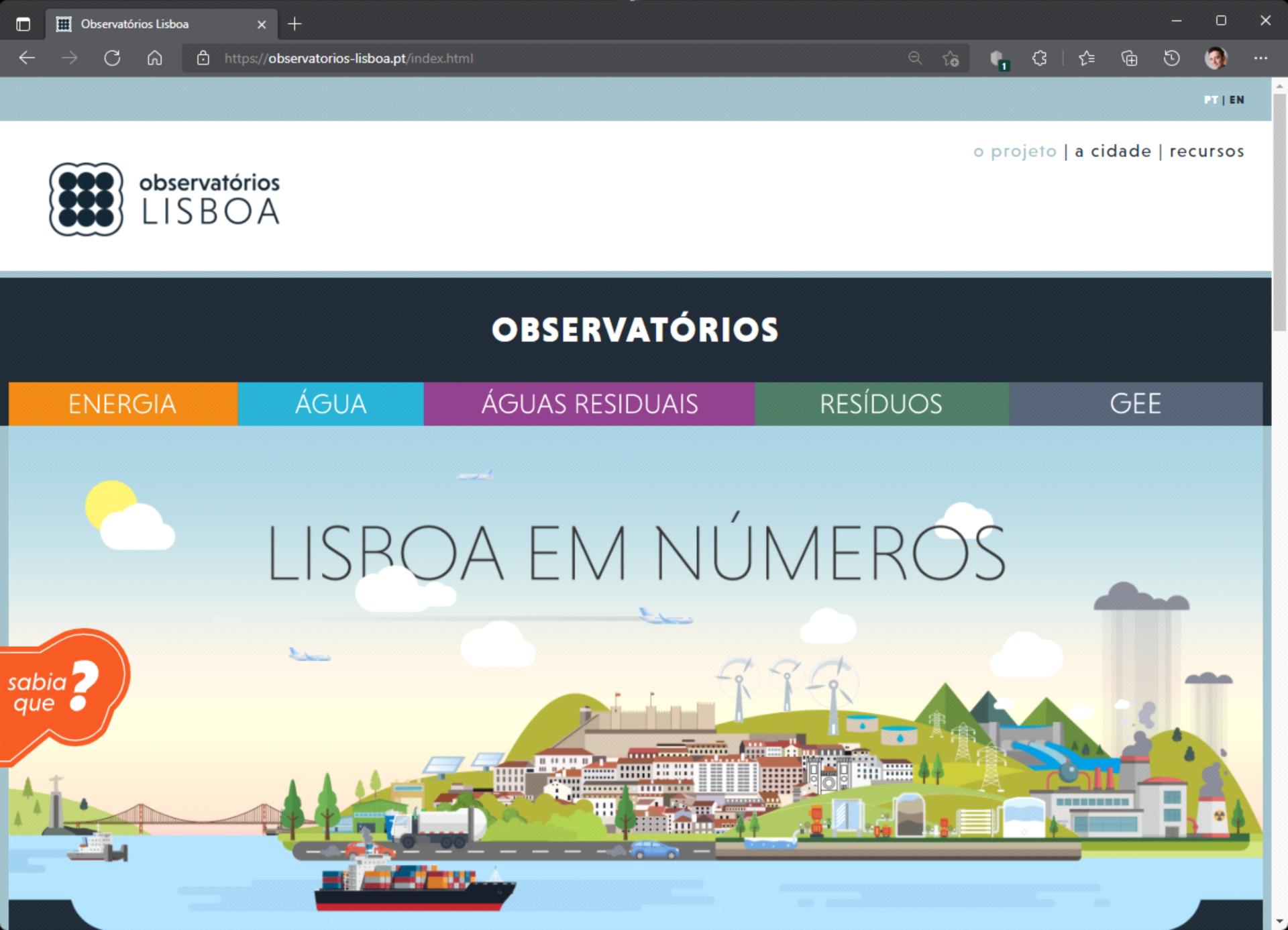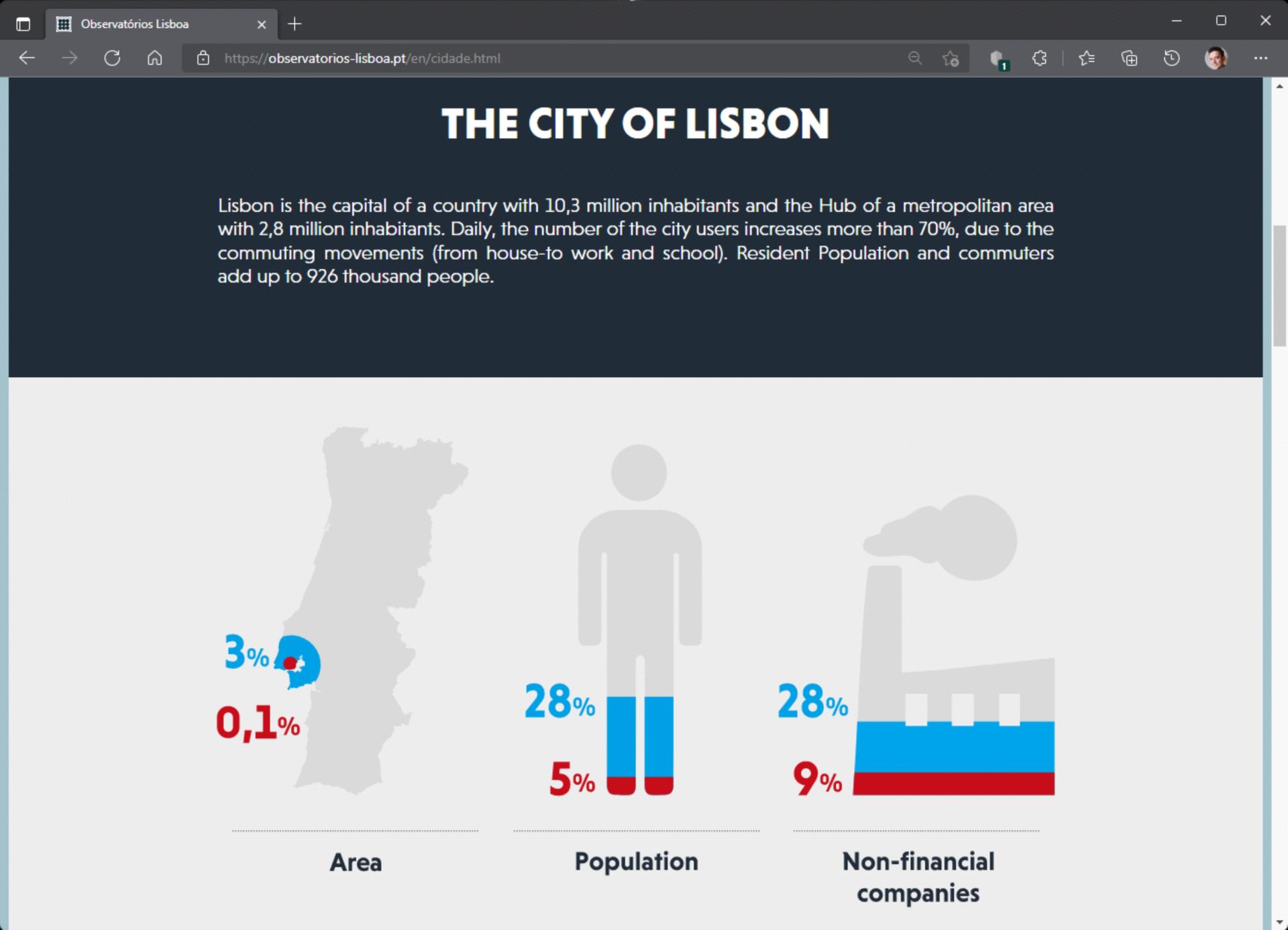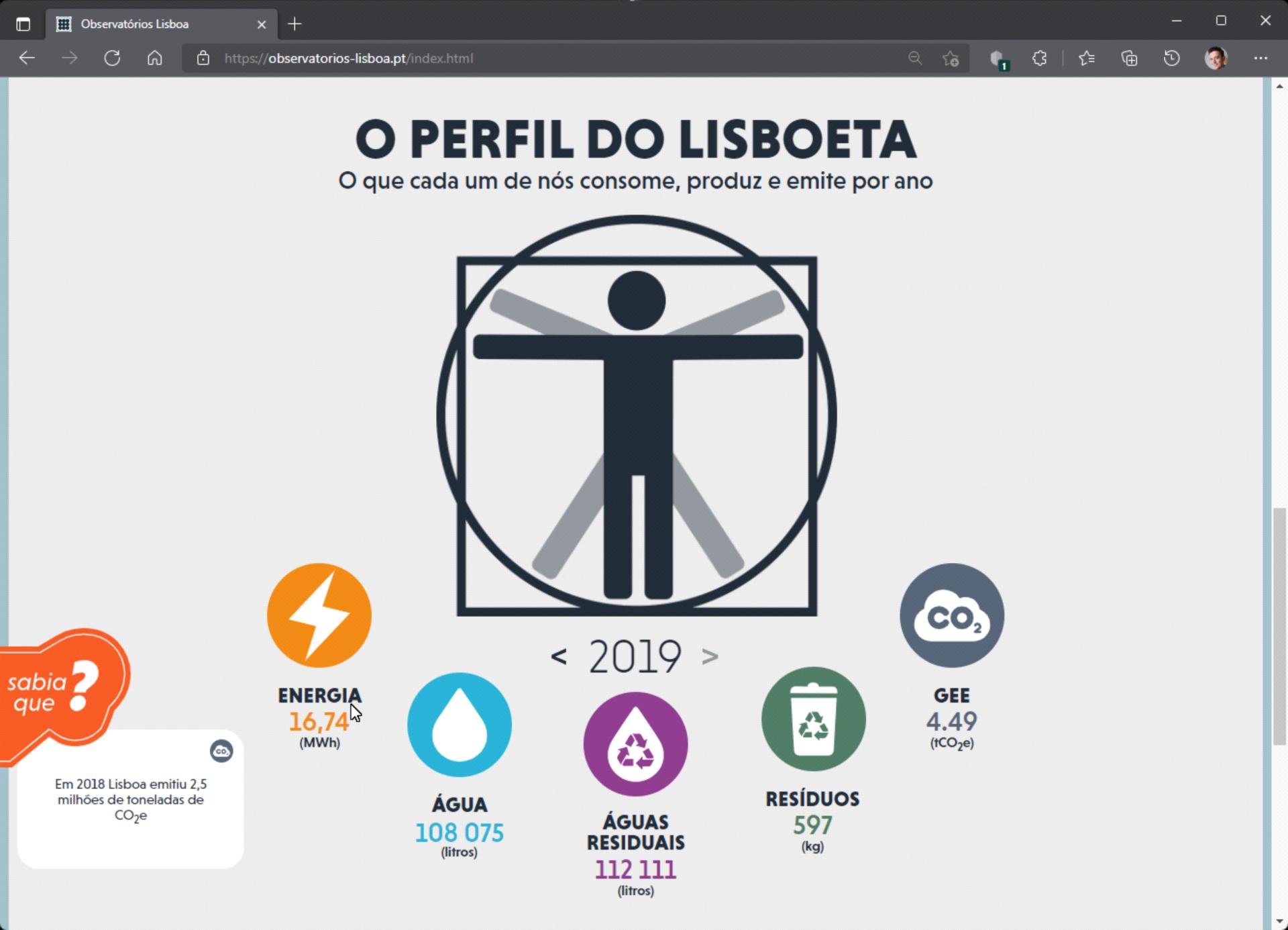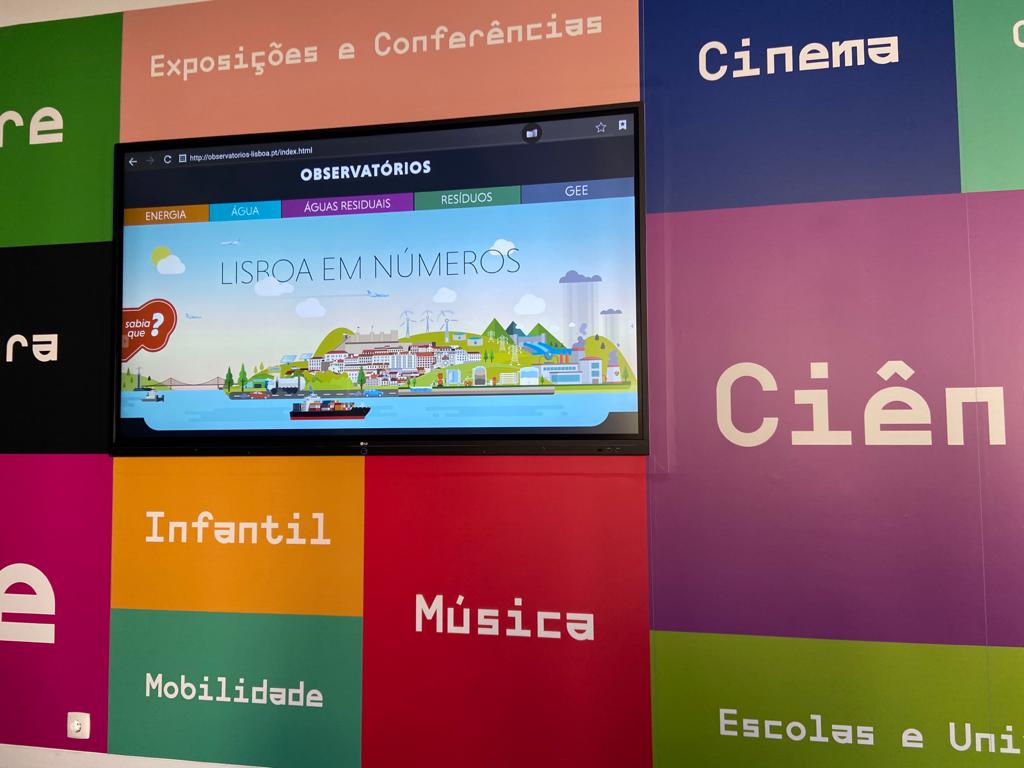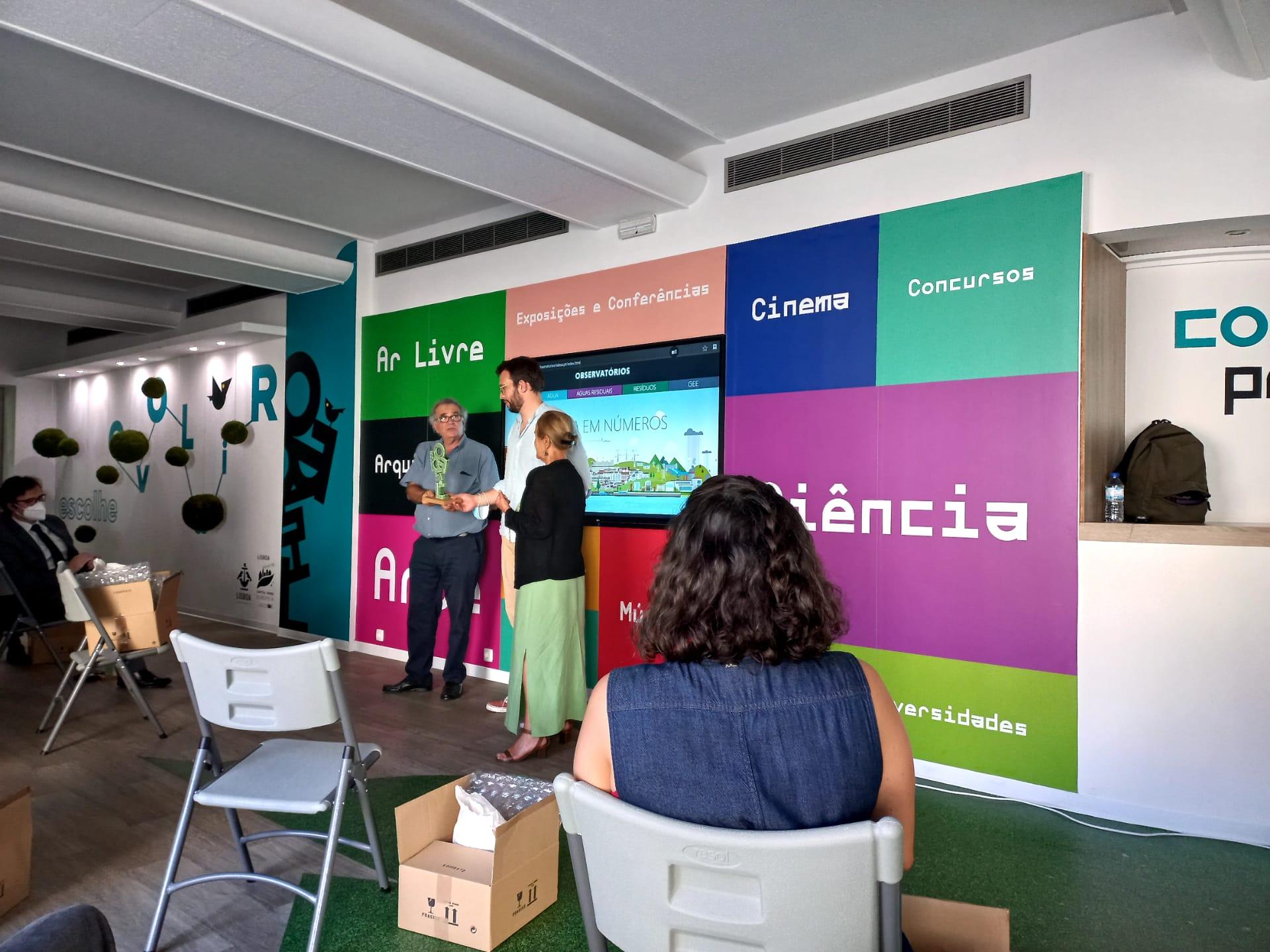Observatórios Lisboa
Basic information
Project Title
Full project title
Category
Project Description
Lisbon Observatories
Creative data to build awareness, engage and empower citizens at local level
Information and knowledge are crucial elements for well-informed citizens feel aware, empowered, and committed with public policy challenges. Only with accessible, comprehensive, and clear data enables the impact monitoring of our behavior - as individuals and as part of a group - in the quality of life and environment we live and, therefore, continue the path towards the transition.
Geographical Scope
Project Region
Urban or rural issues
Physical or other transformations
EU Programme or fund
Which funds
Description of the project
Summary
The ‘Lisbon Observatories’ project achieves a commitment with communication and information, making available a tool to build awareness and promote citizenship. It is true that "if you can't measure it, you can't improve it." (Peter F. Drucker); but it’s no less true that, despite the fact that we have more data than ever before, we’re still missing accessible, comprehensive, and clear data - in particularly at the local level - to monitor our options and provide knowledge to citizenship.
Lisbon Observatories consists in a web portal (https://observatorios-lisboa.pt), aggregating data from several (cross-cutting and interrelated) sustainability dimensions (energy, water & wastewater, waste and GHG emissions) of the city.
An important concept associated with this project is displaying information with use of infographics, enhancing the data usefulness and facilitating its comprehension. For more specialized audiences, raw data download is available. Additionally, inspired by the Vitruvian Man (celebrated by Leonardo DaVinci), the Observatories present a set of per capita indicators (What each of us consumes, produces, and emits per year).
The Lisbon City Council and Lisboa E-Nova regard ‘Lisbon Observatories’ as an initiative of great interest within city's sustainability policies, particularly in the scope of the recent Climate Action Plan, approved in the scope of C40 Cities commitment. Besides directly addressing engaging and empowerment barriers, it plays an important role as a performance monitoring tool (top-down approach). In fact, 'Lisbon Observatories' was the bullseye answer to address the identified barriers: creative data to build awareness, engage and empower citizens.
Key objectives for sustainability
Three important subjects were at the origin of the Lisbon Observatories project and outlined its key objectives and implementation.
First, Lisbon was the European Green Capital 2020 (https://lisboagreencapital2020.com), a distinction that clearly acknowledges:
i) Lisbon´s efforts towards a sustainable city,
ii) The substantial progress made and,
iii) The significant challenges towards citizens engagement with a greener future.
One should bear in mind that Lisbon faces the southern European harsh climate, increasing its responsibility and commitment in placing climate change at the heart of the political agenda of southwestern cities and Portuguese-speaking countries.
Second, and long before European Green Capital (since 2012), climate change was included as one of the seven fundamental urban policies, which in turn translated into a set of citywide management measures and guidelines. Lisbon environmental policy is likewise reflected in its commitment with international networks, such as the Covenant of Mayors, since 2009, or C40 Cities membership in 2019, within the scope of which Lisbon is currently adopting its Climate Action Plan (CAP Lisbon 2030).
Third, the CAP Lisbon 2030 itself boosted the city medium/long-term commitments: action for 2030, clear ambition for 2050. In short, CAP 2030 commits to a climate neutral, resilient, and inclusive city.
Crossing and integrating these 3 subjects, Lisbon Observatories project addresses important goals in terms of sustainability:
- Putting together (aggregating) large sets of data from several (cross-cutting and interrelated) sustainability components of the city.
- Promoting public disclosure and city performance evaluation (top-down approach).
- Addressing citizens engaging and empowerment barriers.
- Additionally, the Lisbon Observatories play a very relevant role during the information and training sessions on the Lisbon Green Participatory Budget (https://op.lisboaparticipa.pt).
Key objectives for aesthetics and quality
‘Lisbon Observatories’ was developed aiming to achieve a differentiated design and experience compared to the many existing websites with information on sustainability. Many initiatives focused on sustainability were identified, but whose completeness and/or level of detail was not homogeneous; that is, it responded to corporate goals, whether NGOs, public or private bodies, which aimed to show parts of all available information (according to their audiences and expectations).
This led us to define some important fundamentals: disclosing accessible, beautiful, comprehensive, and clear data will empower us to be conscious about the impact of our options. Furthermore (for example), the project publishes data on all forms of energy (and not just a few); disaggregates information by each of the relevant sectors (and not just some); show the relative weight of energy forms and sectors and, not least, express data in per capita contribution. The per capita issue was also an important challenge in terms of design and aesthetics. To integrate all the components (inspired by Da Vinci’s Vitruvian Man) the Observatories present a set of per capita indicators (What each of us consumes, produces, and emits per year). The symbology of Vitruvius (perfection and proportionality of the human figure) was thus transposed to the average contribution of an individual who is part of the community.
To fulfill these challenges, it was necessary to define a simple and coherent aesthetic language for each of the sustainability components (energy and water consumption, waste and wastewater production, and GHG emissions). An animated skyline of the city was designed over which the cycle of each sustainability components was introduced as a layer. This aesthetical approach enables any audience, including citizens (non-specialized) to understand the concepts, help interpretating data and, moreover, generate interest and curiosity about the information (the "sense of belonging").
Key objectives for inclusion
As mentioned above, since 2012 climate change was included as one of the seven fundamental urban policies, which in turn translated into a set of citywide management measures and guidelines. And the fact is that the more we get to know about integrating sustainability policies in the city, the more we realize the gaps and the need to improve, particularly in terms of citizen involvement and inclusion.
Despite this enormous 12 years effort – and probable because of it – the lack of critical mass of the institutions and the low involvement of citizens in the major decisions of the city remains an important barrier that limits sustainability policies effectiveness. This important fact became all too obvious as we developed the Lisbon CAP, namely in the stakeholder and citizens consultation processes. Given the cross-cutting features of a Climate Action Plan, namely its cross-sectoral nature (water, energy, circular economy and GHG), Lisboa E-Nova and the Lisbon City Council realized of uppermost importance to involve and inform key stakeholders, namely by sharing information with citizens, businesses and other city's institutions.
The ‘Lisbon Observatories’ project presents itself as a response:
i) directly addressing engaging and empowerment barriers,
ii) enabling top-down performance and,
iii) playing a very relevant role during the information and training sessions on the Lisbon Green Participatory Budget (https://op.lisboaparticipa.pt). The 2021 edition was dedicated to sustainability promotion projects (health promotion, clean energy, adaptation, circular economy, smart mobility, fair food system) and a record of 251 applications were submitted.
Results in relation to category
This project is about providing local solutions to global challenges. It is inspiring, dedicated to build awareness on the basic layers of sustainability (environmental data) and contributes to create a sense of belonging, to a community that – globally aligned - is committed to achieve high sustainability goals (climate neutrality) and therefore needs accessible, comprehensive, and clear data to monitor the impact of their options as individuals and as part of a group.
The experience and the good feedback we have received enabled us to make plans and, in a near future, extend the ‘Lisbon Observatories’ concept to other, no less relevant, environmental dimensions of the city, such as mobility and air quality.
How Citizens benefit
The data made available by the Observatories includes the result of an extensive technical work carried out within the scope of CAP 2030. Despite the existence of public data (e.g., regional statistics published annually and reported to Eurostat), some data sources were identified that did not met acceptable levels of disclosure considering the barriers identified. An example is the data held by concessionaires of waste, water and wastewater management systems, whose level of disclosure of information does not guarantee the objectives of the project. It was therefore necessary to directly involve these stakeholders to get a commitment with data availability, in coherent formats and at least annually. Additionally, these stakeholders (CML - Lisbon City Council / DGEG - General Directorate of Energy and Geology / APA - Portuguese Environment Agency / EPAL - Lisbon Water Company / AdTA - Wastewater Management Company / Valorsul - Recovery and Treatment of Urban Waste from the Lisbon Region) also participated in the technical review of the infographic layers that featured each quantified sustainability component (the different tabs in the portal).
This made possible to create a link with data suppliers to ensure that the data, its structure, and indicators were not discrete in time, but periodic, coherent and public disclosed.
Additionally, two other levels of involvement must be highlighted:
- The multiple management bodies of Lisbon's municipal services, which made an important contribution to identify (and mediate contacts) with data providers.
- Lisboa E-Nova members and groups of citizens who, as test-users, early identified the need of having a mean to aggregate data from the various sustainability components of the city.
This involvement also made possible, for example, to identify future developments, namely the inclusion of data on urban mobility and air quality in the Lisbon Observatories.
Physical or other transformations
Innovative character
- Simple and coherent aesthetic language for each of the sustainability components
- Differentiated experience (local iconography), with accessible, beautiful, comprehensive, and clear data
- Data completeness, homogeneous and coherent level of desegregation.
- Set of per capita indicators (What each of us consumes, produces, and emits per year) to quantify average individual contribution.
- Complex data accessible to non-specialized audience, assisted by infographics to understand the concepts and generate interest and curiosity about the information.
- All data available for download (images and spreadsheet formats).
Learning transferred to other parties
The commitment of cities and regions towards sustainability and climate action fortunately occurs across Europe. And we know that the participation of more cities and regions will be greater, the more capable and aware society and citizens are (something already quite highlighted in this application). And, in the case of Portugal, Lisbon played a very important role in leading by example. Lisbon was the first, and currently the only Portuguese member of the C40 Cities Alliance. In the context of the Covenant of Mayors, around 50 signatory Portuguese cities have already formally adopted mitigation targets for 2030. More recently, on 31st January, the Climate-Neutral and Smart Cities Mission received “Expressions of Interest” from 19 Portuguese cities out of 362 eligible EIOs.
And in this context, we believe that the Observatories project played a role, if not decisive, at least important, in the sharing and transfer of experiences with other parts and contexts. Communication actions and participation in conferences with the Observatories project enabled its dissemination in a comprehensive and focused way. The type of data available concerns any region or city in the world, and the communication approach used can be systematized and transferred:
- Identification, mapping and engagement with relevant information sources and stakeholders.
- Definition of a unique graphic identity, guaranteeing a sense of belonging on the part of the citizens.
- Build a robust database, and comprehensive communication channels.
- Proceed, informed by feedback and results obtained (e.g., public participation processes) with increasing engagement with new sources of information and new stakeholders.

